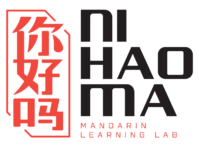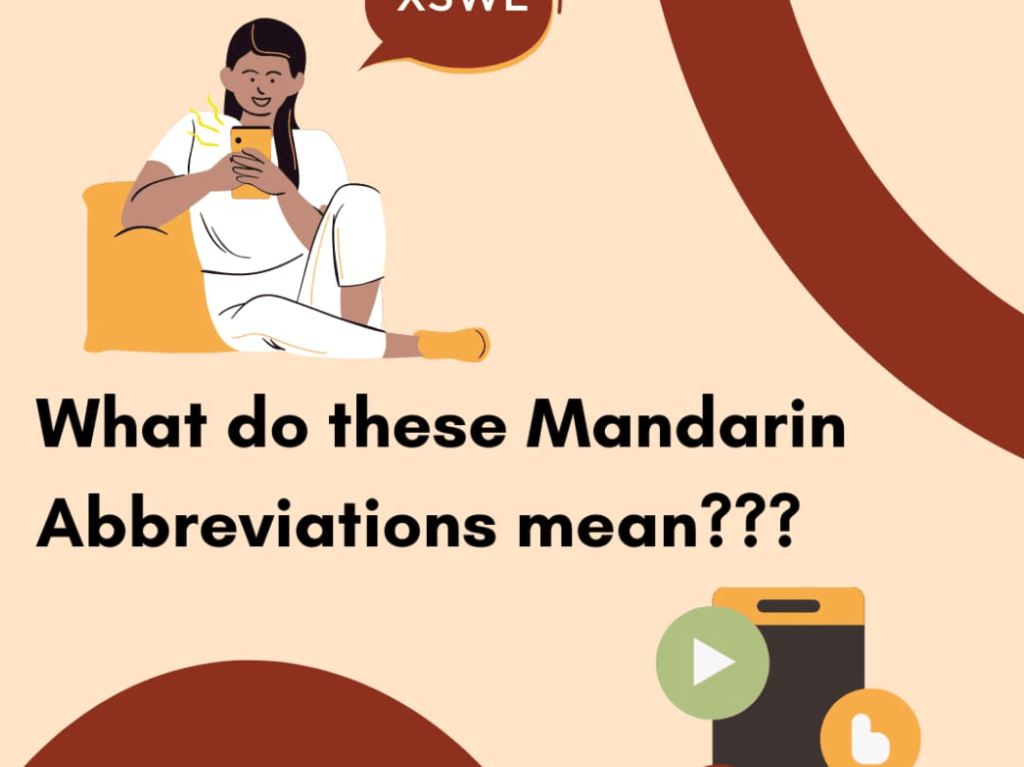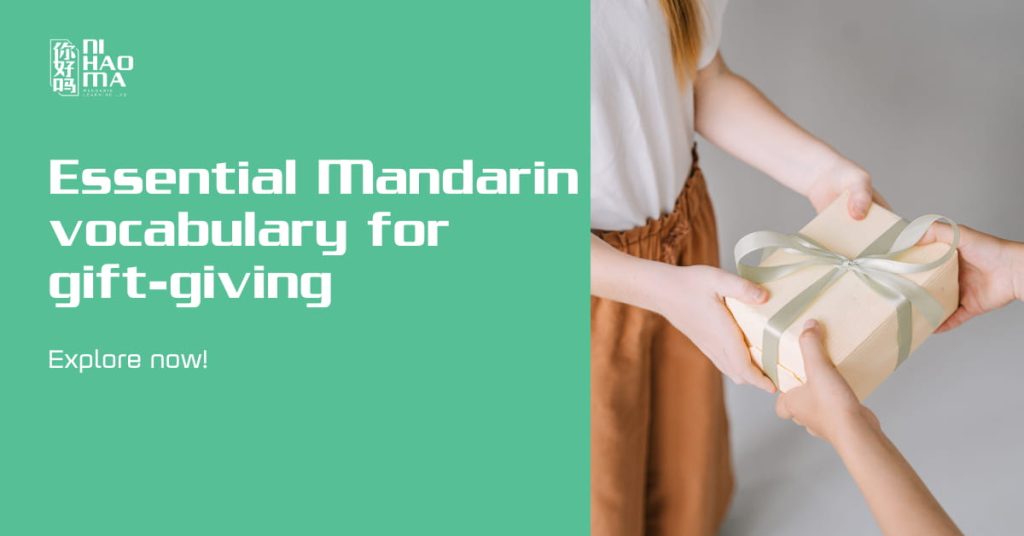Lunar New Year – also known as the Spring Festival – is the most important and meaningful celebration in many Asian cultures, especially in China and Vietnam. If you’re learning Chinese or interested in Chinese culture, knowing what Lunar New Year in Chinese is called and related vocabulary will help you communicate more confidently about this festive topic.
What Is Lunar New Year in Chinese?
In Chinese, Lunar New Year is called 春节 (Chūn Jié), which literally means “Spring Festival.” It is the biggest and most significant holiday of the year for Chinese people, as well as for many other East Asian countries, including Vietnam.

The Lunar New Year follows the lunar calendar, a system based on the cycles of the Moon. It not only marks the transition between the old and new lunar year but is also a sacred time to honor ancestors, reunite with family, and celebrate a hopeful beginning full of luck, happiness, and prosperity.
Vocabulary Related to the Lunar New Year in Chinese
Lunar New Year is a deeply rooted cultural celebration in the spiritual and daily life of the Chinese and many other East Asian communities. By learning vocabulary related to the Lunar New Year in Chinese, you don’t just gain useful language for everyday communication — you also gain a deeper understanding of traditional customs and how Chinese people celebrate this important holiday. Let’s explore some key terms!
Vocabulary: Deities Worshipped During Lunar New Year
In traditional Chinese beliefs, various deities play a central role during the Lunar New Year. Worshipping these spiritual figures is a way to show respect and to wish for blessings, wealth, and peace for the family in the coming year.
| Chinese | Pinyin | Meaning |
|---|---|---|
| 灶神 | Zào shén | Kitchen God |
| 财神 | Cái shén | God of Wealth |
| 土地神 | Tǔ dì shén | Earth God |
| 门神 | Mén shén | Door Guardian |
| 福禄寿三星 | Fú lù shòu sānxīng | Fu Lu Shou (Three Star Gods of fortune, prosperity, and longevity) |
| 龙王 | Lóng wáng | Dragon King |
| 玉皇上帝 | Yù Huáng Shàng Dì | Jade Emperor |
| 观音菩萨 | Guān yīn pú sà | Goddess of Mercy (Guanyin) |
| 城隍爷 | Chéng huáng yé | City God |
| 南曹 | Nán cáo | Southern Judge (Underworld deity) |
| 北斗 | Běi dǒu | Big Dipper deity |
| 文昌帝君 | Wén chāng dì jūn | God of Literature and Study |
| 祖宗 | Zǔ zōng | Ancestors (forefathers, grandparents) |

Vocabulary Related to Activities and Traditions
The Lunar New Year in Chinese is not just a time for celebration — it’s a season rich in customs, rituals, and joyful gatherings. Below is a vocabulary list of common traditions and activities observed during this holiday:
| Chinese | Pinyin | Meaning |
|---|---|---|
| 过年 | guò nián | Celebrate the Lunar New Year |
| 守岁 | shǒu suì | Stay up on New Year’s Eve |
| 拜年 | bài nián | Give New Year greetings |
| 敬酒 | jìng jiǔ | Offer a toast |
| 扫墓 | sǎo mù | Visit and clean ancestors’ graves |
| 烧香 | shāo xiāng | Burn incense |
| 烧纸钱 | shāo zhǐqián | Burn joss paper |
| 祈福 | qí fú | Pray for blessings |
| 祭拜 | jì bài | Make offerings |
| 放生 | fàng shēng | Release animals (for merit) |
| 开运 | xīng dào | First visitor of the year (lucky visit) |
| 买年货 | mǎi nián huò | Shop for Lunar New Year goods |
| 扫房 | sǎo fáng | Clean the house |
| 团圆 | tuán yuán | Family reunion |
| 供佛 | gòng fó | Make offerings to Buddha |
| 挂灯笼 | guà dēng lóng | Hang lanterns |
| 吃饺子 | chī jiǎo zi | Eat dumplings |
| 穿新衣 | chuān xīn yī | Wear new clothes |
| 看春晚 | kàn chūn wǎn | Watch the Spring Festival Gala |
| 吃年夜饭 | chī nián yè fàn | Eat the reunion dinner |
| 贴年画 | tiē nián huà | Put up New Year posters |
| 放烟花 | fàng yān huā | Set off fireworks |
| 放鞭炮 | fàng biānpào | Set off firecrackers |
| 拜访 | bàifǎng | Visit relatives and friends |
| 发红包 | fā hóng bāo | Give red envelopes (lì xì) |
| 逛花市 | guàng huā shì | Visit the flower market |
| 喝酒 | hē jiǔ | Drink alcohol |
Vocabulary: Lunar New Year Food in Chinese
The Lunar New Year in Chinese culture is not complete without food. This is a time of indulgence and sharing traditional dishes that carry symbolic meanings of luck, wealth, and unity.
| Chinese | Pinyin | Meaning |
|---|---|---|
| 饺子 | jiǎo zi | Dumplings |
| 年糕 | nián gāo | Glutinous rice cake |
| 汤圆 | tāng yuán | Sweet rice balls |
| 春卷 | chūn juǎn | Spring rolls |
| 长寿面 | cháng shòu miàn | Longevity noodles |
| 酱牛肉 | jiàng niú ròu | Braised beef |
| 红烧肉 | hóngshāo ròu | Soy-braised pork belly |
| 粽子 | zòng zi | Sticky rice dumplings |
| 烧鸡 | shāo jī | Roasted or boiled chicken |
| 苦瓜汤 | kǔguā tāng | Bitter melon soup |
| 肉冻 | ròu dòng | Meat jelly |
| 糯米饭 | nuòmǐ fàn | Sticky rice |
| 绿豆糕 | lǜ dòu gāo | Mung bean cake |
| 越南粽子 | yuè nán zòng zi | Bánh chưng / Bánh tét (Vietnamese sticky rice cake) |
| 香肠 | xiāngcháng | Chinese sausage |
| 馄饨 | húntún | Wontons |
| 烤鸭 | kǎo yā | Roast duck |
| 鱼 | yú | Fish (symbolizing surplus) |
| 火锅 | huǒ guō | Hotpot |
| 瓜子 | guāzǐ | Sunflower seeds |
| 红枣 | hóngzǎo | Red dates |
| 花生糖 | huāshēng táng | Peanut candy |
| 蜜饯 | mìjiàn | Preserved fruits |
Vocabulary about Folk Performing Arts
| Chinese | Pinyin | Meaning |
|---|---|---|
| 舞龙 | wǔ lóng | Dragon dance |
| 舞狮 | wǔ shī | Lion dance |
| 踩高跷 | cǎi gāoqiāo | Walk on stilts |
| 杂技 | zájì | Acrobatics |
| 皮影戏 | píyǐngxì | Shadow puppetry |
| 木偶戏 | mù ǒu xì | Puppet show |
| 相声 | xiàngsheng | Comic dialogue (cross-talk) |
| 戏曲 | xìqǔ | Traditional Chinese opera |
| 京剧 | jīngjù | Peking opera |
| 评书 | píngshū | Storytelling |
| 灯会 | dēng huì | Lantern festival |
| 打鼓 | dǎ gǔ | Drumming |
| 唱戏 | chàng xì | Operatic singing |
| 唱民歌 | chàng mín gē | Folk singing |
| 民乐演奏 | mín yuè yǎn zòu | Traditional music performance |

Essential Vocabulary for Lunar New Year in Chinese
| Chinese | Pinyin | Meaning |
|---|---|---|
| 农历 | nóng lì | Lunar calendar |
| 正月 | zhēng yuè | First month of the lunar year |
| 除夕 | chú xī | Lunar New Year’s Eve |
| 新年 | xīn nián | New Year |
| 元宵节 | yuán xiāo jié | Lantern Festival (15th day of Lunar New Year) |
| 年画 | nián huà | New Year paintings |
| 春联 | chūnlián | Spring Festival couplets |
| 红包 | hóngbāo | Red envelope |
| 花灯 | huā dēng | Decorative lanterns |
| 烟花 | yānhuā | Fireworks |
| 五果盘 | wǔ guǒ pán | Five-fruit tray |
| 供桌 | gòng zhuō | Ancestral altar |
| 庙会 | miàohuì | Temple fair |
| 书法 | shū fǎ | Calligraphy |
| 生肖 | shēng xiào | Chinese zodiac |
| 属龙 | shǔ lóng | Born in the Year of the Dragon |
| 红纸 | hóng zhǐ | Red paper |
| 礼物 | lǐ wù | Gifts |
| 灯笼 | dēnglóng | Lantern |
| 鞭炮 | biānpào | Firecrackers |
| 桃花 | táo huā | Peach blossoms |
| 梅花 | méi huā | Apricot blossoms |
| 传统 | chuántǒng | Tradition |
| 习俗 | xísú | Custom |
Popular Lunar New Year Greetings in Chinese
The Lunar New Year is a time to exchange warm and lucky wishes. Below are some meaningful greetings you can send to Chinese-speaking friends, family, or colleagues:
新年快乐!
Xīnnián kuàilè!
→ Happy New Year!
恭喜发财,万事如意!
Gōngxǐ fācái, wànshì rúyì!
→ Wishing you wealth and success!
财源滚滚,生意兴隆!
Cáiyuán gǔngǔn, shēngyì xīnglóng!
→ May wealth flow in and business flourish!
家庭幸福,美满安康!
Jiātíng xìngfú, měimǎn ānkāng!
→ Wishing your family happiness and health!
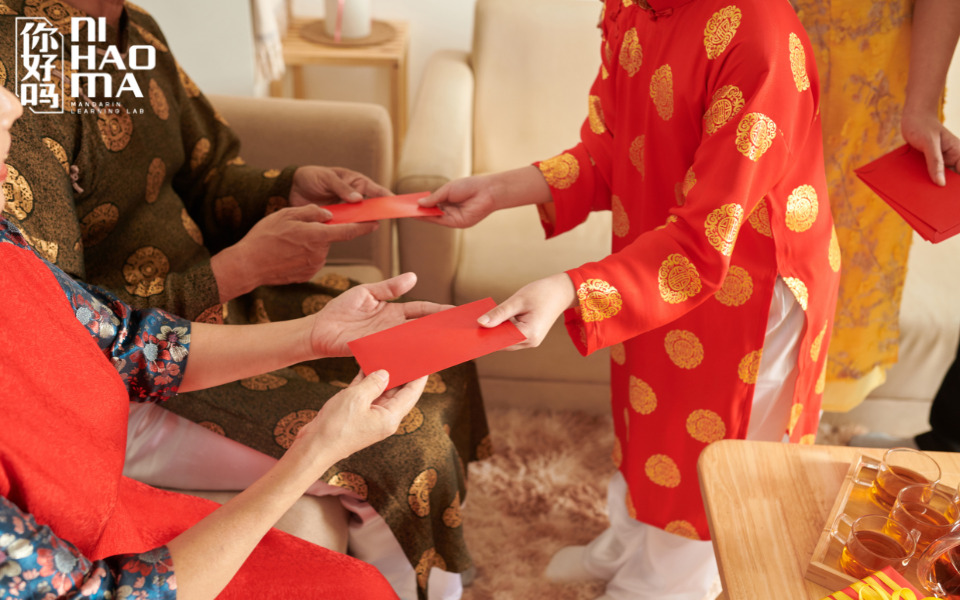
福如东海,寿比南山!
Fú rú dōnghǎi, shòu bǐ nánshān!
→ May your blessings be as vast as the sea and your life as long as the mountains!
愿您新年吉祥如意,财源广进,身体健康!
Yuàn nín xīnnián jíxiáng rúyì, cáiyuán guǎngjìn, shēntǐ jiànkāng!
→ May you have a lucky, prosperous, and healthy New Year!
愿你学习进步,金榜题名,梦想成真!
Yuàn nǐ xuéxí jìnbù, jīnbǎng tímíng, mèngxiǎng chéng zhēn!
→ Wishing you academic success and the realization of your dreams!
新年到,愿你天天开心,事事顺心,幸福满满!
Xīnnián dào, yuàn nǐ tiāntiān kāixīn, shìshì shùnxīn, xìngfú mǎnmǎn!
→ May the New Year bring you joy every day, smooth paths, and full happiness!
See also: 50+ Best Chinese New Year Greetings
Lunar New Year Dialogues in Chinese
Are you looking for ways to practice Chinese during the Lunar New Year? Just by mastering a few basic phrases, you can start a meaningful conversation with Chinese friends or colleagues. In this section, Ni Hao Ma will provide some sample dialogues on the topic of Lunar New Year in Chinese to help you practice right at home!
Dialogue 1: Preparing for Lunar New Year
A: 你快过年了,准备好回家了吗?
Nǐ kuài guònián le, zhǔnbèi hǎo huí jiā le ma?
The New Year is coming. Are you ready to go home?
B: 还在准备呢,我打算买些礼物带回去。
Hái zài zhǔnbèi ne, wǒ dǎsuàn mǎi xiē lǐwù dài huí qù.
Still preparing. I plan to buy some gifts to bring back.
A: 对,过年回家一定要带点东西。
Duì, guònián huí jiā yídìng yào dài diǎn dōngxi.
Yes, you must bring something home for the New Year.
B: 你准备带什么?
Nǐ zhǔnbèi dài shénme?
What are you bringing?
A: 一些特产和爸妈喜欢的点心。
Yìxiē tèchǎn hé bàmā xǐhuān de diǎnxīn.
Some local specialties and snacks my parents like.
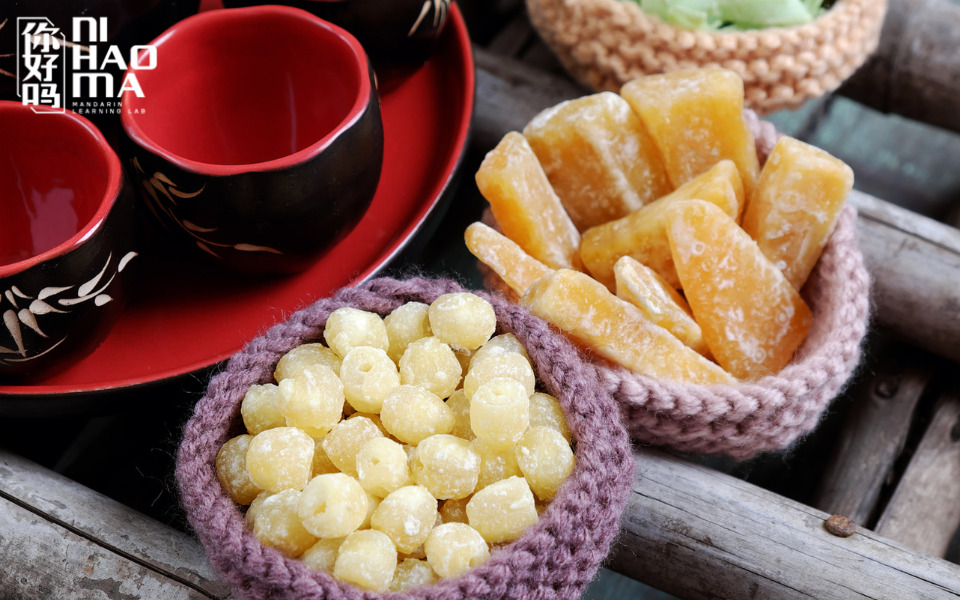
Dialogue 2: New Year Greetings
A: 新年快乐!祝你身体健康,万事如意!
Xīnnián kuàilè! Zhù nǐ shēntǐ jiànkāng, wànshì rúyì!
Happy New Year! Wishing you good health and all the best!
B: 谢谢你!也祝你新的一年心想事成,工作顺利!
Xièxiè nǐ! Yě zhù nǐ xīn de yì nián xīnxiǎng shì chéng, gōngzuò shùnlì!
Thank you! Wishing you success and smooth work in the new year too!
A: 你今年打算怎么过春节?
Nǐ jīnnián dǎsuàn zěnme guò Chūnjié?
How do you plan to celebrate this Lunar New Year?
B: 和家人一起吃年夜饭,然后去拜年。你呢?
Hé jiārén yìqǐ chī niányèfàn, ránhòu qù bàinián. Nǐ ne?
Eat the New Year’s Eve dinner with my family, then go visit relatives. You?
A: 我也差不多,最期待的是红包!
Wǒ yě chàbuduō, zuì qīdài de shì hóngbāo!
Same here! I’m most excited about the red envelopes!
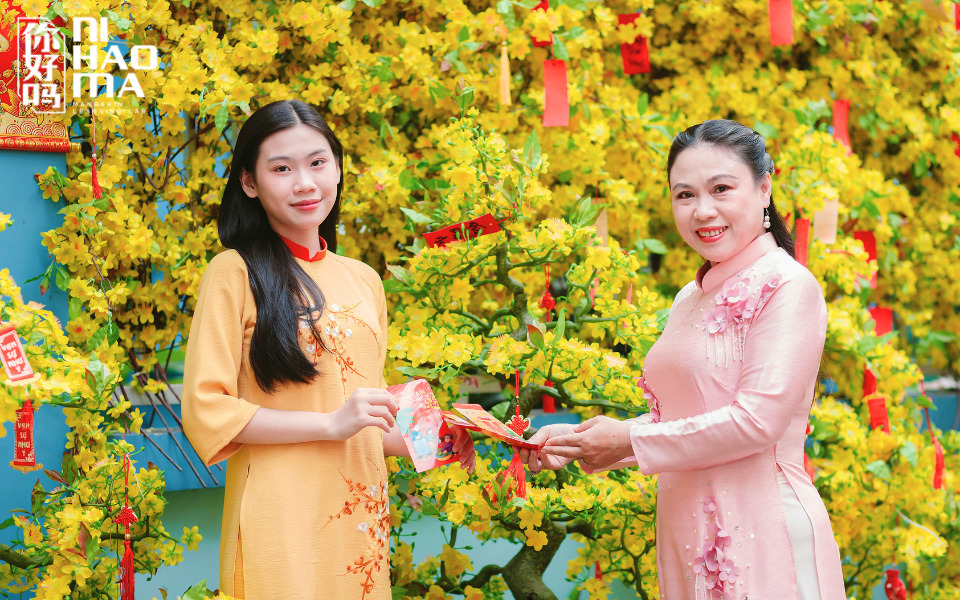
Dialogue 3: New Year Customs
A: 你们家春节都有什么习俗?
Nǐmen jiā Chūnjié dōu yǒu shénme xísú?
What traditions does your family follow during the Lunar New Year?
B: 我们会贴春联、吃饺子,还有守岁。
Wǒmen huì tiē chūnlián, chī jiǎozi, hái yǒu shǒusuì.
We hang Spring Couplets, eat dumplings, and stay up for New Year’s Eve.
A: 守岁我也喜欢,一起看春节联欢晚会。
Shǒusuì wǒ yě xǐhuān, yìqǐ kàn Chūnjié liánhuān wǎnhuì.
I like staying up too—especially to watch the Spring Festival Gala.
B: 小时候还会收很多红包,现在都要发出去啦。
Xiǎoshíhòu hái huì shōu hěn duō hóngbāo, xiànzài dōu yào fā chūqù la.
I used to receive many red envelopes as a kid—now I’m the one giving them away!
Conclusion
The Lunar New Year in Chinese culture is much more than a celebration—it’s a time for reunion, reflection, and renewal. Hopefully, through this guide from Ni Hao Ma, you’ve gained valuable vocabulary, useful greetings, and practical dialogue examples to help you confidently talk about Lunar New Year in Chinese. 新年快乐!(Xīnnián kuàilè!) — Happy New Year!
